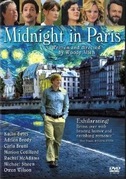
I'm not going to talk about the plot of the film; you can find that information on numerous review sites. What I want to talk about is the film's message and what it meant to me. After seeing "You will meet a tall dark stranger" I was a little reluctant to see “Midnight in Paris”, because Woody Allen has made some hit/miss films for the last several years. I was hoping to repeat the eye-opening, funny and charming experience that I had when I saw "Vicky Christina Barcelona."Even though it lacks the depth that is prevalent in his earlier work, “Midnight in Paris” is a beautifully photographed film with a strong and prominent message.
The film begins with a lengthy montage of numerous Paris landmarks. Allen shows us the sunny side of the City of Lights, as well as the rainy side, and then takes us back to the rejuvenating sunny side. As with all good films, the beginning montage sequence conveys metaphorically what the protagonist’s experience will be in the film.
The beautiful images within the montage reveal the magic and unpredictability that Paris offers. In short, anything can happen in the City of Lights.
Common to fairy tales, mystical happenings occur at midnight, and here Gil is transported to the 1920’s, to the Golden Age of art and culture, via a charming antique 1920 Peugeot Landaulet.
This time period is not randomly selected – it is the period that Gil idolizes and uses in his soon to-be novel, and is one of the most creative and hopeful eras in human history.
The prevailing thought after the Great War was that Good can conquer Evil, and life can be just. This positive energy spurred artists to create some of the greatest works of music, literature and art that we’ve seen. This time period rich with artists and writers is as inspirational to Gill as his present is mundane and unfulfilling.
The strange thing is that in both time periods, Gil finds artists who believe they aren't famous or successful enough. They rationalize to themselves that they live in the wrong era. Some are nostalgic and romanticize the past, some become indifferent to their unfulfilled present, and others become existentialist.
The questions, posed in the film, are answered by the words of Gertrude Stein. Stein, ahead of her time, both in her personal and literary life, knows good writing as well as the artists’ roles in life. The answer to the first question-what is art, is summarized in Stein’s response to Gil’s novel. She reads his novel and never comments on the fact that the novel is written 90 years in the future. Why? Because good writing is good writing and like any art that is worth recognizing, it doesn't matter when it is created, or if it has universal appeal. The second question - what is the role of artists in society and why are they so important to us? Gertrude Stein (I’m paraphrasing) says that: The role of the artist is to find the antidote to the meaningless existence that we all live in. This is the film’s one instance where Woody Allen reveals his existentialist point of view.
4 / 5
Written and Directed by Woody Allen
Starring: Owen Wilson, Rachel McAdams, Kathy Bates, Marion Cotillard
The beautiful images within the montage reveal the magic and unpredictability that Paris offers. In short, anything can happen in the City of Lights.
Common to fairy tales, mystical happenings occur at midnight, and here Gil is transported to the 1920’s, to the Golden Age of art and culture, via a charming antique 1920 Peugeot Landaulet.
This time period is not randomly selected – it is the period that Gil idolizes and uses in his soon to-be novel, and is one of the most creative and hopeful eras in human history.
The prevailing thought after the Great War was that Good can conquer Evil, and life can be just. This positive energy spurred artists to create some of the greatest works of music, literature and art that we’ve seen. This time period rich with artists and writers is as inspirational to Gill as his present is mundane and unfulfilling.
The strange thing is that in both time periods, Gil finds artists who believe they aren't famous or successful enough. They rationalize to themselves that they live in the wrong era. Some are nostalgic and romanticize the past, some become indifferent to their unfulfilled present, and others become existentialist.
The questions, posed in the film, are answered by the words of Gertrude Stein. Stein, ahead of her time, both in her personal and literary life, knows good writing as well as the artists’ roles in life. The answer to the first question-what is art, is summarized in Stein’s response to Gil’s novel. She reads his novel and never comments on the fact that the novel is written 90 years in the future. Why? Because good writing is good writing and like any art that is worth recognizing, it doesn't matter when it is created, or if it has universal appeal. The second question - what is the role of artists in society and why are they so important to us? Gertrude Stein (I’m paraphrasing) says that: The role of the artist is to find the antidote to the meaningless existence that we all live in. This is the film’s one instance where Woody Allen reveals his existentialist point of view.
4 / 5
Written and Directed by Woody Allen
Starring: Owen Wilson, Rachel McAdams, Kathy Bates, Marion Cotillard
 RSS Feed
RSS Feed